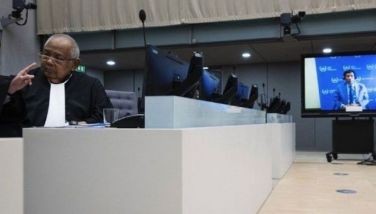Getting on

July 22, 2004 | 12:00am
Ok. Fine. Angelo de la Cruz is alive.
This humiliating episode is over.
Now we can begin getting on with our lives. We need to begin mending our fences with the rest of the world for the aggravation we caused them by being flimsy in the face of terror.
Let’s not even begin with Washington. Let’s begin with Tokyo. The other day, the same terrorists who took Angelo threatened Japanese nationals with harm unless Tokyo does what the Philippines did: pull out its troops under duress.
Over the next few days, we should expect other nationalities to be similarly threatened. Our capitulation to terrorists gives terrorism a boost.
We might have even begun a trend of capitulationism. On the day Angelo was released, an Egyptian trucking company doing legitimate business agreed to pull out its trucks in exchange for a driver taken hostage by the terrorists.
But what the heck, let’s enjoy the glow of this moment. It is short-lived.
By tomorrow, after the media has bled this story dry, reporting on the slightest detail about what food was prepared in Angelo’s home for his homecoming, the story dies.
This was, after all, a made-for-television melodrama that swamped our policy and overwhelmed our sense of proportion. It has all the elements of a telenovela: the suspense over a life hanging on the balance; the frantic maneuvers of government negotiators racing against time; the peril of an emotional dam breaking as it did in the case of Contemplacion; the camera-friendly faces of loved ones in the grip of extreme anxiety; the large scenes of leftist demonstrators waving colorful banners and chanting slanderous slogans.
This is The Year of Living Dangerously on reality TV.
This drama allowed the major television outfits to flaunt their ability to send reporters abroad, file stories using the latest internet-based equipment and simultaneously project images of grieving people in Pampanga along with live feeds from Baghdad. This is a spectacle of technology, riding the crest of an emotional moment publicly shared and driven by the ratings game networks play.
Television as a medium dictated how this "crisis" was to be processed in the public mind.
There are aspects of this "crisis" that lent themselves easily to visual clips that make television interesting and compelling: the emotional appeals of the victim’s family; the worried faces of bureaucrats; the street scenes in Baghdad; and the rabble-rousers trying to exploit the situation to win political points. These are the fleeting if compelling, transient if convincing elements of this "crisis."
Then there are the aspects of this "crisis" that do not lend themselves to the television medium: international obligation; moral hazard; the credibility of nations; the financial and investment consequences of diminished confidence. Although they are not visible on the televisions screen, they have lasting effects on the life of this nation.
And so it was that while we contemplated the life of one man, we completely ignored the life of our nation.
Because of that, public appreciation of the dimensions of this crisis and the long-term consequences of options we choose was dragged down to the lowest level. Television ratings might have been increased by this "crisis," but the quality of public debate was dragged down to the cellar.
The events of the past few days convinced me that the print medium needs to survive the onslaught of multimedia. The print medium allows us to more carefully examine the nuances of meanings, appreciate principles and grasp the abstract but powerful concepts that shape our destiny – concepts such as national self-respect, the integrity of policy and the importance of confidence.
I am quite sure that l’affaire de la Cruz will, many years from now, be a suitable case study for a thesis in political science. Such a thesis might examine the consequences for the ability of nations to conduct far-sighted policy in an age where television undermines far-sightedness and panders to fleeting emotions captured in fleeting images.
For better or for worse, television is the arena where grand public debates are settled. Those who espouse one or the other side of a policy debate need to be able to do soundbites.
Finely crafted and elegantly argued essays might convince the learned. But they cannot sway the multitudes whose votes will matter at crunch time.
I have taken cognizance of this cruel reality long before, which is why I have ventured into television even if my native medium is print. I hope, perhaps vainly, to create enough controversy on the television screen to draw viewers into becoming readers of what I write.
But the soundbite is a very different sword to wield. It can slash through the thicket of issues but it cannot pierce the essence of things as finely as the written word.
On television, the sloganeers and the rabble-rousers have the upper hand. Advocates of a well thought out strategy are in an inferior position.
Which is why l’affaire de la Cruz ran the course that it did.
The decisions President Gloria had to make the past few days were not easy ones. Public opinion was split down the middle. Any option taken will have its political costs: although some immediate and others sitting further down the road.
But they were not of equal weight. The better informed, the more cosmopolitan, the more strategically-disposed, the more forward-looking too the position that we ought not to yield to terrorism – even the cost of a life.
Those more easily swayed by the emotionalism of the moment thought we ought to surrender on those intangible things like national self-respect and moral hazards in order to save the real neck of a real person.
Once more, what the heck.
Sit back and enjoy the drama unfold. Celebrate with the neighbors and kin of Angelo de la Cruz who comes home intact and alive. Soak in the relief we all feel and worry only much later of the danger we have put all the other Filipino workers under because we sent out the signal that acts of terrorism pays.
I, too, am interested if Angelo’s neighbors will indeed get to cook that cobra in adobong tuyo to celebrate the fact that this poor man did not become a martyr.
This humiliating episode is over.
Now we can begin getting on with our lives. We need to begin mending our fences with the rest of the world for the aggravation we caused them by being flimsy in the face of terror.
Let’s not even begin with Washington. Let’s begin with Tokyo. The other day, the same terrorists who took Angelo threatened Japanese nationals with harm unless Tokyo does what the Philippines did: pull out its troops under duress.
Over the next few days, we should expect other nationalities to be similarly threatened. Our capitulation to terrorists gives terrorism a boost.
We might have even begun a trend of capitulationism. On the day Angelo was released, an Egyptian trucking company doing legitimate business agreed to pull out its trucks in exchange for a driver taken hostage by the terrorists.
But what the heck, let’s enjoy the glow of this moment. It is short-lived.
By tomorrow, after the media has bled this story dry, reporting on the slightest detail about what food was prepared in Angelo’s home for his homecoming, the story dies.
This was, after all, a made-for-television melodrama that swamped our policy and overwhelmed our sense of proportion. It has all the elements of a telenovela: the suspense over a life hanging on the balance; the frantic maneuvers of government negotiators racing against time; the peril of an emotional dam breaking as it did in the case of Contemplacion; the camera-friendly faces of loved ones in the grip of extreme anxiety; the large scenes of leftist demonstrators waving colorful banners and chanting slanderous slogans.
This is The Year of Living Dangerously on reality TV.
This drama allowed the major television outfits to flaunt their ability to send reporters abroad, file stories using the latest internet-based equipment and simultaneously project images of grieving people in Pampanga along with live feeds from Baghdad. This is a spectacle of technology, riding the crest of an emotional moment publicly shared and driven by the ratings game networks play.
Television as a medium dictated how this "crisis" was to be processed in the public mind.
There are aspects of this "crisis" that lent themselves easily to visual clips that make television interesting and compelling: the emotional appeals of the victim’s family; the worried faces of bureaucrats; the street scenes in Baghdad; and the rabble-rousers trying to exploit the situation to win political points. These are the fleeting if compelling, transient if convincing elements of this "crisis."
Then there are the aspects of this "crisis" that do not lend themselves to the television medium: international obligation; moral hazard; the credibility of nations; the financial and investment consequences of diminished confidence. Although they are not visible on the televisions screen, they have lasting effects on the life of this nation.
And so it was that while we contemplated the life of one man, we completely ignored the life of our nation.
Because of that, public appreciation of the dimensions of this crisis and the long-term consequences of options we choose was dragged down to the lowest level. Television ratings might have been increased by this "crisis," but the quality of public debate was dragged down to the cellar.
The events of the past few days convinced me that the print medium needs to survive the onslaught of multimedia. The print medium allows us to more carefully examine the nuances of meanings, appreciate principles and grasp the abstract but powerful concepts that shape our destiny – concepts such as national self-respect, the integrity of policy and the importance of confidence.
I am quite sure that l’affaire de la Cruz will, many years from now, be a suitable case study for a thesis in political science. Such a thesis might examine the consequences for the ability of nations to conduct far-sighted policy in an age where television undermines far-sightedness and panders to fleeting emotions captured in fleeting images.
For better or for worse, television is the arena where grand public debates are settled. Those who espouse one or the other side of a policy debate need to be able to do soundbites.
Finely crafted and elegantly argued essays might convince the learned. But they cannot sway the multitudes whose votes will matter at crunch time.
I have taken cognizance of this cruel reality long before, which is why I have ventured into television even if my native medium is print. I hope, perhaps vainly, to create enough controversy on the television screen to draw viewers into becoming readers of what I write.
But the soundbite is a very different sword to wield. It can slash through the thicket of issues but it cannot pierce the essence of things as finely as the written word.
On television, the sloganeers and the rabble-rousers have the upper hand. Advocates of a well thought out strategy are in an inferior position.
Which is why l’affaire de la Cruz ran the course that it did.
The decisions President Gloria had to make the past few days were not easy ones. Public opinion was split down the middle. Any option taken will have its political costs: although some immediate and others sitting further down the road.
But they were not of equal weight. The better informed, the more cosmopolitan, the more strategically-disposed, the more forward-looking too the position that we ought not to yield to terrorism – even the cost of a life.
Those more easily swayed by the emotionalism of the moment thought we ought to surrender on those intangible things like national self-respect and moral hazards in order to save the real neck of a real person.
Once more, what the heck.
Sit back and enjoy the drama unfold. Celebrate with the neighbors and kin of Angelo de la Cruz who comes home intact and alive. Soak in the relief we all feel and worry only much later of the danger we have put all the other Filipino workers under because we sent out the signal that acts of terrorism pays.
I, too, am interested if Angelo’s neighbors will indeed get to cook that cobra in adobong tuyo to celebrate the fact that this poor man did not become a martyr.
BrandSpace Articles
<
>
- Latest
- Trending
Trending
Latest
Latest
Recommended

April 26, 2025 - 12:00am


























